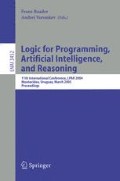Abstract
We provide uniform and invertible logical rules in a framework of relational hypersequents for the three fundamental t-norm based fuzzy logics i.e., Łukasiewicz logic, Gödel logic, and Product logic. Relational hypersequents generalize both hypersequents and sequents-of-relations. Such a framework can be interpreted via a particular class of dialogue games combined with bets, where the rules reflect possible moves in the game. The problem of determining the validity of atomic relational hypersequents is shown to be polynomial for each logic, allowing us to develop Co-NP calculi. We also present calculi with very simple initial relational hypersequents that vary only in the structural rules for the logics.
Research supported by C. Bühler-Habilitations-Stipendium H191-N04, FWF Project Nr. P16539-N04, and Marie Curie Fellowship 501043.
Access this chapter
Tax calculation will be finalised at checkout
Purchases are for personal use only
Preview
Unable to display preview. Download preview PDF.
References
Aguzzoli, S.: Uniform description of calculi for all t-norm logics. In: Henkin, L., et al. (eds.) Proceedings of 34th IEEE International Symposium on Multiple-Valued Logic (ISMVL 2004), pp. 38–43 (2004)
Avron, A.: Hypersequents, logical consequence and intermediate logics for concurrency. Annals of Mathematics and Artificial Intelligence 4(3–4), 225–248 (1991)
Avron, A., Konikowska, B.: Decomposition Proof Systems for Gödel-Dummett Logics. Studia Logica 69(2), 197–219 (2001)
Baaz, M., Ciabattoni, A., Fermüller, C.: Cut-elimination in a sequents-of-relations calculus for Gödel logic. In: International Symposium on Multiple Valued Logic (ISMVL 2001), pp. 181–186. IEEE, Los Alamitos (2001)
Baaz, M., Fermüller, C.: Analytic calculi for projective logics. In: Murray, N.V. (ed.) TABLEAUX 1999. LNCS (LNAI), vol. 1617, pp. 36–50. Springer, Heidelberg (1999)
Fermüller, C., Preining, N.: A dialogue game for intuitionistic fuzzy logic based on comparison of degrees of truth. In: Proceedings of In Tech 2003 (2003)
Giles, R.: A non-classical logic for physics. Studia Logica 4(33), 399–417 (1974)
Giles, R.: A non-classical logic for physics. In: Wojcicki, R., Malinkowski, G. (eds.) Selected Papers on Łukasiewicz Sentential Calculi, pp. 13–51. Polish Academy of Sciences (1977)
Hähnle, R.: Automated Deduction in Multiple-Valued Logics. Oxford University Press, Oxford (1993)
Hájek, P.: Metamathematics of Fuzzy Logic. Kluwer, Dordrecht (1998)
Jeavons, P.G., Cohen, D.A., Gyssens, M.: Closure properties of constraints. The Journal of the ACM 44, 527–548 (1997)
Lorenzen, P.: Logik und Agon. In: tti Congr. Internaz. di Filosofia, pp. 187–194. Sansoni (1960)
Metcalfe, G., Olivetti, N., Gabbay, D.: Goal-directed calculi for Gödel-Dummett logics. In: Baaz, M., Makowsky, J.A. (eds.) CSL 2003. LNCS, vol. 2803, pp. 413–426. Springer, Heidelberg (2003)
Metcalfe, G., Olivetti, N., Gabbay, D.: Analytic proof calculi for product logics. Archive for Mathematical Logic 43(7), 859–889 (2004)
Metcalfe, G., Olivetti, N., Gabbay, D.: Goal-directed methods for Łukasiewicz logics. In: Marcinkowski, J., Tarlecki, A. (eds.) CSL 2004. LNCS, vol. 3210, pp. 85–99. Springer, Heidelberg (2004)
Metcalfe, G., Olivetti, N., Gabbay, D.: Sequent and hypersequent calculi for abelian and Łukasiewicz logics. To appear in ACM TOCL (2005)
Schrijver, A.: Theory of Linear and Integer Programming. John Wiley and Sons, Chichester (1987)
Author information
Authors and Affiliations
Editor information
Editors and Affiliations
Rights and permissions
Copyright information
© 2005 Springer-Verlag Berlin Heidelberg
About this paper
Cite this paper
Ciabattoni, A., Fermüller, C.G., Metcalfe, G. (2005). Uniform Rules and Dialogue Games for Fuzzy Logics. In: Baader, F., Voronkov, A. (eds) Logic for Programming, Artificial Intelligence, and Reasoning. LPAR 2005. Lecture Notes in Computer Science(), vol 3452. Springer, Berlin, Heidelberg. https://doi.org/10.1007/978-3-540-32275-7_33
Download citation
DOI: https://doi.org/10.1007/978-3-540-32275-7_33
Publisher Name: Springer, Berlin, Heidelberg
Print ISBN: 978-3-540-25236-8
Online ISBN: 978-3-540-32275-7
eBook Packages: Computer ScienceComputer Science (R0)

